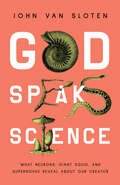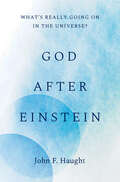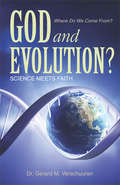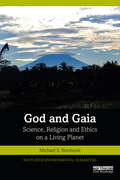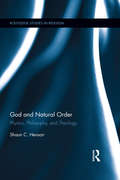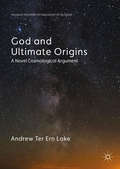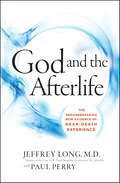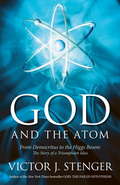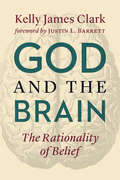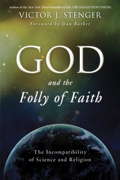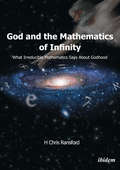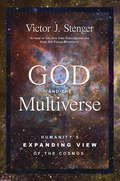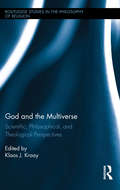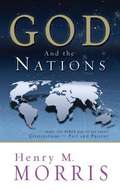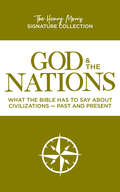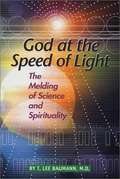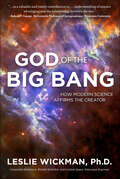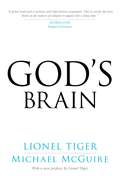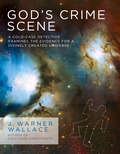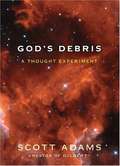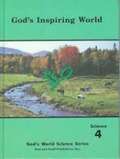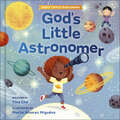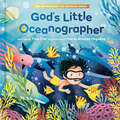- Table View
- List View
God Speaks Science: What Neurons, Giant Squid, and Supernovae Reveal About Our Creator
by John Van SlotenA joy-filled expedition into experiencing God&’s majestic, everywhere presence.DNA, the Danube River, and deep-sea life. Knees and trees. The Swiss Alps, songbirds, and supernovas. God speaks though His creation. And you don&’t have to be naturally gifted at biology, chemistry, or physics to be awakened to His wisdom and majesty. Pastor, teacher, and non-scientist John Van Sloten invites us to know God more deeply as we marvel at the complexities of His amazing creation.Knowing God through His written Word enables us to know Him more clearly through His creational Words. How does God speak through His creation, and what is He saying? Each chapter includes interviews with leading scientists and connects creation to its Creator. With the primary foundation that Jesus is the mediator of both salvation and creation, Van Sloten fields questions such as:Why are things beautiful and how can beautiful things be engaged?How does the doctrine of the Trinity teach us about the nature of tree branches and wound healing?What do the doctrines of creation, incarnation, and the resurrection tell us about phenomenon of supernovas?How do we engage God&’s providence through knees and fossils?We were made to wonder. To marvel. To know and live in awe of God. God Speaks Science expands our hearts and minds so that we might delight in the wisdom, beauty, and awesome power of our triune God!
God after Einstein: What's Really Going On in the Universe?
by John F. HaughtA leading theologian presents a hopeful account of the universe after Einstein, exploring it as a meaningful drama of awakening&“This book is a deep and provocative piece of theology that proposes we engage with the universe as a kind of narrative of awakening and unfolding, as well as an important and useful approach for thinking about theology with respect to modern cosmology.&”—Matthew Stanley, New York University Before the early twentieth century, scientists and theologians knew almost nothing about time&’s enormity and the corresponding immensity of space. But now, after Einstein, cosmology offers theology a whole new way of looking at the ageless questions about matter, time, God, cosmic purpose, and the significance of our lives. The universe need not be thought of as simply an endless reshuffling of lifeless and mindless atoms in a pointless series of moments. Rather, the universe is a temporal drama of awakening whose meaning can be revealed only gradually by looking, in a spirit of anticipation and hope, toward the horizon of the cosmic future. In conversation with Einstein&’s ideas and opinions, John F. Haught develops here a new cosmological understanding of the meaning of God, time, eternity, mystery, life, thought, freedom, and faith. In doing so, he offers readers a new way of understanding the relationship of science to theology.
God and Evolution?
by Gerard M. Verschuuren Carlos A. SevillaWhere do we come from? Can a believing Christian accept evolutionary theory? What about? Intelligent Design? Are devout believers naïve and ill-equipped to take on current scientific debates? Can faith and science be reconciled? What does the Catholic Church teach about science and faith? Book jacket.
God and Gaia: Science, Religion and Ethics on a Living Planet (Routledge Environmental Humanities)
by Michael S NorthcottGod and Gaia explores the overlap between traditional religious cosmologies and the scientific Gaia theory of James Lovelock. It argues that a Gaian approach to the ecological crisis involves rebalancing human and more-than-human influences on Earth by reviving the ecological agency of local and indigenous human communities, and of nonhuman beings. Present-day human ecological influences on Earth have been growing at pace since the Scientific and Industrial Revolutions, when modern humans adopted a machine cosmology in which humans are the sole intelligent agency. The resultant imbalance between human and Earthly agencies is degrading the species diversity of ecosystems, causing local climate changes, and threatens to destabilise the Earth as a System. Across eight chapters this ambitious text engages with traditional cosmologies from the Indian Vedas and classical Greece to Medieval Christianity, with case material from Southeast Asia, Southern Africa and Great Britain. It discusses concepts such as deep time and ancestral time, the ethics of genetic engineering of foods and viruses, and holistic ecological management. Northcott argues that an ontological turn that honours the differential agency of indigenous humans and other kind, and that draws on sacred traditions, will make it is possible to repair the destabilising impacts of contemporary human activities on the Earth System and its constituent ecosystems. This book will be of considerable interest to students and scholars of the environmental humanities, history, and cultural and religious studies.
God and Natural Order: Physics, Philosophy, and Theology (Routledge Studies in Religion)
by Shaun C. HensonIn God and Natural Order: Physics, Philosophy, and Theology, Shaun Henson brings a theological approach to bear on contemporary scientific and philosophical debates on the ordered or disordered nature of the universe. Henson engages arguments for a unified theory of the laws of nature, a concept with monotheistic metaphysical and theological leanings, alongside the pluralistic viewpoints set out by Nancy Cartwright and other philosophers of science, who contend that the nature of physical reality is intrinsically complex and irreducible to a single unifying theory. Drawing on the work of theologian Wolfhart Pannenberg and his conception of the Trinitarian Christian god, the author argues that a theological line of inquiry can provide a useful framework for examining controversies in physics and the philosophy of science. God and Natural Order will raise provocative questions for theologians, Pannenberg scholars, and researchers working in the intersection of science and religion.
God and Ultimate Origins: A Novel Cosmological Argument (Palgrave Frontiers in Philosophy of Religion)
by Andrew Ter Ern LokeThis book develops a novel argument which combines the Kalam with the Thomistic Cosmological Argument. It approaches an ongoing dispute concerning whether there is a First Cause of time from a radically new point of view, namely by demonstrating that there is such a First Cause without requiring the controversial arguments against concrete infinities and against traversing an actual infinite (although the book presents original defenses of these arguments as well). This book also develops a novel philosophical argument for the Causal Principle, namely that 'everything that begins to exist has a cause', and offers a detailed discussion on whether a First Cause of time can be avoided by a causal loop. It also addresses epistemological issues related to the Cosmological Argument which have been relatively neglected by recent publications, and demonstrates (contra Hawking et al) the continual relevance and significance of philosophy for answering ultimate questions.
God and the Afterlife: The Groundbreaking New Evidence for God and Near-Death Experience
by Paul Perry Jeffrey LongThe New York Times–bestselling author presents startling new evidence of God’s existence based on the largest near-death experience study in history. In Evidence of the Afterlife, Dr. Jeffrey Long laid out a strong scientific case for life after death. Now he goes further, revealing evidence that a Supreme Being exists—and there is amazing consistency in the accounts of what he is like.Through his Near Death Experience Research Foundation, Dr. Long collected more than 4,000 reports from people of diverse backgrounds and religious traditions, including nonbelievers, who had credible near-death experiences. Some saw a bright light, others went through a tunnel, still others experienced a review of their life. But many of the accounts shared a remarkably similar description of God; a Supreme Being who radiated love and grace.Expanding on his analysis begun in Evidence of the Afterlife, God and the Afterlife is the first intensive account of the people who have gone to the frontier of heaven, met God, and returned to share their journey. Groundbreaking and profound, it provides new insight into the human experience and expands our notions of mortality, offering possibility, hope, and comfort.
God and the Atom
by Victor J. StengerThis history of atomism, from Democritus to the recent discovery of the Higgs boson, chronicles one of the most successful scientific hypotheses ever devised, making the case that in the final analysis, atoms and the void are all that exists. Originating separately in both ancient Greece and India, the concept of the atom persisted for centuries, despite often running afoul of conventional thinking. Until the twentieth century, no direct evidence for atoms existed. Today it is possible to actually observe atoms using a scanning tunneling microscope. The book begins with the story of the earliest atomists - the ancient Greek philosophers Leucippus, Democritus, and Epicurus, and the Latin poet Lucretius. As the author notes, the idea of elementary particles as the foundation of reality had many opponents throughout history - from Aristotle to Christian theologians and even some nineteenth-century chemists and philosophers. While theists today accept that the evidence for the atomic theory of matter is overwhelming, they reject the atheistic implications of that theory.
God and the Brain: The Rationality of Belief
by Kelly James ClarkDoes cognitive science show that religious belief is irrational?Kelly James Clark brings together science and philosophy to examine some of humanity&’s more pressing questions. Is belief in God, as Richard Dawkins claims, a delusion? Are atheists smarter or more rational than religious believers? Do our genes determine who we are and what we believe? Can our very creaturely cognitive equipment help us discover truth and meaning in life? Are atheists any different from Mother Teresa? Clark&’s surprising answers both defend the rationality of religious belief and contribute to the study of cognitive science.God and the Brain explores complicated questions about the nature of belief and the human mind.Scientifically minded, philosophically astute, and reader-friendly, God and the Brain provides an accessible overview of some new cognitive scientific approaches to the study of religion and evaluates their implications for both theistic and atheistic belief.
God and the Brain: The Rationality of Belief
by Kelly James ClarkDoes cognitive science show that religious belief is irrational?Kelly James Clark brings together science and philosophy to examine some of humanity&’s more pressing questions. Is belief in God, as Richard Dawkins claims, a delusion? Are atheists smarter or more rational than religious believers? Do our genes determine who we are and what we believe? Can our very creaturely cognitive equipment help us discover truth and meaning in life? Are atheists any different from Mother Teresa? Clark&’s surprising answers both defend the rationality of religious belief and contribute to the study of cognitive science.God and the Brain explores complicated questions about the nature of belief and the human mind.Scientifically minded, philosophically astute, and reader-friendly, God and the Brain provides an accessible overview of some new cognitive scientific approaches to the study of religion and evaluates their implications for both theistic and atheistic belief.
God and the Folly of Faith
by Victor J. StengerA thorough and hard-hitting critique that is a must read for anyone interested in the interaction between religion and science.It has become the prevalent view among sociologists, historians, and some theistic scientists that religion and science have never been in serious conflict. Some even claim that Christianity was responsible for the development of science. In a sweeping historical survey that begins with ancient Greek science and proceeds through the Renaissance and Enlightenment to contemporary advances in physics and cosmology, Stenger makes a convincing case that not only is this conclusion false, but Christianity actually held back the progress of science for one thousand years. It is significant, he notes, that the scientific revolution of the seventeenth century occurred only after the revolts against established ecclesiastic authorities in the Renaissance and Reformation opened up new avenues of thought. The author goes on to detail how religion and science are fundamentally incompatible in several areas: the origin of the universe and its physical parameters, the origin of complexity, holism versus reductionism, the nature of mind and consciousness, and the source of morality. In the end, Stenger is most troubled by the negative influence that organized religion often exerts on politics and society. He points out antiscientific attitudes embedded in popular religion that are being used to suppress scientific results on issues of global importance, such as overpopulation and environmental degradation. When religion fosters disrespect for science, it threatens the generations of humanity that will follow ours.
God and the Mathematics of Infinity: What Irreducible Mathematics Says about Godhood
by H. Chris RansfordDrawing on the science and mathematics of infinity, H. Chris Ransford analyzes the traditional concept of godhood and reaches surprising conclusions. He addresses humankind's abiding core debate on the meaning of spirituality and God. Using mathematics, he explores key questions within this debate: for instance, why does evil exist if there is a God? The book fastidiously does not take sides nor proffers opinions, it only follows allowable mathematics wherever it leads. By doing so, it makes a major contribution to an understanding of the nature of reality.
God and the Multiverse
by Victor J. StengerCosmologists have reasons to believe that the vast universe in which we live is just one of an endless number of other universes within a multiverse--a mind-boggling array that may extend indefinitely in space and endlessly in both the past and the future. Victor Stenger reviews the key developments in the history of science that led to the current consensus view of astrophysicists, taking pains to explain essential concepts and discoveries in accessible terminology. The author shows that science's emerging understanding of the multiverse--consisting of trillions upon trillions of galaxies--is fully explicable in naturalistic terms with no need for supernatural forces to explain its origin or ongoing existence. How can conceptions of God, traditional or otherwise, be squared with this new worldview? The author shows how long-held beliefs will need to undergo major revision or otherwise face eventual extinction.From the Hardcover edition.
God and the Multiverse: Scientific, Philosophical, and Theological Perspectives (Routledge Studies in the Philosophy of Religion)
by Klaas KraayIn recent decades, scientific theories have postulated the existence of many universes beyond our own. The details and implications of these theories are hotly contested. Some philosophers argue that these scientific models count against the existence of God. Others, however, argue that if God exists, a multiverse is precisely what we should expect to find. Moreover, these philosophers claim that the idea of a divinely created multiverse can help believers in God respond to certain arguments for atheism. These proposals are, of course, also extremely controversial. This volume collects together twelve newly published essays – two by physicists, and ten by philosophers – that discuss various aspects of this issue. Some of the essays support the idea of a divinely created multiverse; others oppose it. Scientific, philosophical, and theological issues are considered.
God and the Nations
by Dr Henry M. MorrisBehold, the nations are as a drop of a bucket, and are counted as the small dust of the balance...Isaiah 40:15 A fascinating title from creationist icon Henry Morris Perfect for Christians who focus on apologetics Focuses on a rare, but important topic: God's plan for individual countries In the Bible, we see the interest God has in humans and their cultures. In the Old and New Testaments, the Hebrew and Greek words for "nations" occurs 720 times. Many of the nations that were given land and resources during Bible times have now passed into history, such as the Assyrians, Babylonians, and Hittites. We also know from secular history that civilizations like the Aztecs and Greeks are also largely removed from the scene. All this is due to those nations rejection of God's laws. Indeed, of the 200 nations in existence today, only a handful actively seek God.
God and the Nations: What the Bible has to say about Civilizations - Past and Present (The Henry Morris Signature Collection)
by Henry MorrisDespite living in a very connected world today, few of us have any real understanding of the history of nations. Secular scholars and scientists from various fields rarely consult the Bible’s rich history on the subject. Yet if we consider what the Bible has to say about the global community’s past—and future—achievements and mistakes, we discover a saga as fascinating as anything produced in Hollywood. In God & the Nations, Dr. Henry Morris does an unusual thing: he shows clearly that God is even more interested in the fate of each person as He is about the unfolding of national stories. Additionally, he delves into the mysterious world of Bible prophecy to proclaim the God of the Bible as truly unique. Morris, through this study of civilizations, reveals the origins and purpose for the whole world!
God at the Speed of Light: The Melding of Science and Spirituality
by T. Lee BaumannTo whichever end of the spectrum our beliefs gravitate--that of spirituality or that of science--the universe is an astonishing and mysterious place. But what if the ends of the spectrum are moving closer together? What if our increasing knowledge in both science and spirituality is pointing us all in the same direction? Physician Lee Baumann examines the premise--that spirituality and quantum physics are, in fact, two sides of the same coin: the presence of a guiding intelligence in the universe, the presence of God.
God of the Big Bang: How Modern Science Affirms the Creator
by Leslie WickmanPh.D. expert in astronautical and aeronautical engineering provides good news for believers -- new scientific research supports the idea that the universe was created by God.
God's Brain
by Lionel Tiger Michael McGuireIn the fractious debate on the existence of God and the nature of religion, two distinguished authors radically alter the discussion. Taking a perspective rooted in evolutionary biology with a focus on brain science, the authors elucidate the perennial questions about religion: What is its purpose? How did it arise? What is its source? Why does every known culture have some form of it? Their answer is deceptively simple, yet at the same time highly complex: The brain creates religion and its varied concepts of God, and then in turn feeds on its creation to satisfy innate neurological and associated social needs. Brain science reveals that humans and other primates alike are afflicted by unavoidable sources of stress that the authors describe as "brainpain." To cope with this affliction people seek to "brainsoothe." We humans use religion and its social structures to induce brainsoothing as a relief for innate anxiety. How we do this is the subject of this groundbreaking book. In a concise, lively, accessible, and witty style, the authors combine zoom-lens vignettes of religious practices with discussions of the latest research on religion’s neurological effects on the brain. Among other topics, they consider religion’s role in providing positive socialization, its seeming obsession with regulating sex, creating an afterlife, how religion’s rules of behavior influence the law, the common biological scaffolding between nonhuman primates and humans and how this affects religion, a detailed look at brain chemistry and how it changes as a result of stress, and evidence that the palliative effects of religion on brain chemistry is not matched by nonreligious remedies. Concluding with a checklist offering readers a means to compute their own "brainsoothe score," this fascinating book provides key insights into the complexities of our brain and the role of religion, perhaps its most remarkable creation.
God's Crime Scene: A Cold-Case Detective Examines the Evidence for a Divinely Created Universe
by J. Warner WallaceThere are four ways to die, and only one of them requires an intruder. Suicides, accidental, and natural deaths can occur without any evidence from outside the room. But murders typically involve suspects external to the crime scene. If there's evidence of an outside intruder, homicide detectives have to prepare for a chase. Intruders turn death scenes into crime scenes. Join J. Warner Wallace, former atheist, seasoned cold-case detective, and popular national speaker as he tackles his most important case ... with you on the jury! With the expertise of a cold-case detective, J. Warner examines eight critical pieces of evidence in the "crime scene" of the universe to determine if they point to a Divine Intruder. If you have ever wondered if something (or someone) outside the natural realm created the universe and everything in it, this is the case for you.
God's Debris: A Thought Experiment
by Scott Adams"God's Debris" is a set of provocative questions (thought experiments) about God and science, wrapped in a fictional story. It is designed to inspire readers to question their views of reality.
God's Inspiring World: Science 4 (God's World Science Ser.)
by Lester Miller Barbara Schlabach Naomi Eicher Lapp Jonathan ShowalterAlso included are helpful suggestions for extra activities. Other lesson helps, such as the lesson guide and suggestions for class projects, are placed below the reduced pages. Copies of the tests with answers are included too.
God's Little Astronomer (God's Little Explorers)
by Tina ChoBlast off to space and discover how every part of the universe—the planets, the stars, asteroids, meteoroids, and more—display God&’s glory, creativity, and, most important, his love for you and me!&“An informative and inspirational bridge between science and religion for Christian households&”—Kirkus ReviewsIn God's Little Astronomer, author and educator Tina Cho invites young readers to blast off to see God&’s creation in the heavens. From the sun, moon, stars, constellations, and comets, this out-of-this-world introduction to space will teach budding astronomers new words, facts, and concepts, while also encouraging them to see God throughout the universe, and reinforcing the message that the same God loves them too.Each page includes fact-filled sidebars plus an accompanying Bible verse, making God's Little Astronomer the perfect combination of faith and science for budding scientists.
God's Little Oceanographer (Big Adventures for Growing Minds)
by Tina ChoRide the waves before diving into the depths of sea to uncover the wonders of the ocean—and God&’s deep love for you and me!From the ocean's surface, all the way to its deepest depths, this immersive picture book will teach little sea lovers new words, facts, and concepts, while also encouraging them to see God's creativity, playfulness, power, and love in every splash and every wave. Written by an elementary school teacher, each page includes fact-filled sidebars plus an accompanying Bible verse, making God's Little Oceanographer the perfect faith friendly science adventure for kids interested in marine life and activities. The masterfully layered and rich illustrations include sharks, dolphins, otters, sea turtles, whales, octopuses, and so much more!
